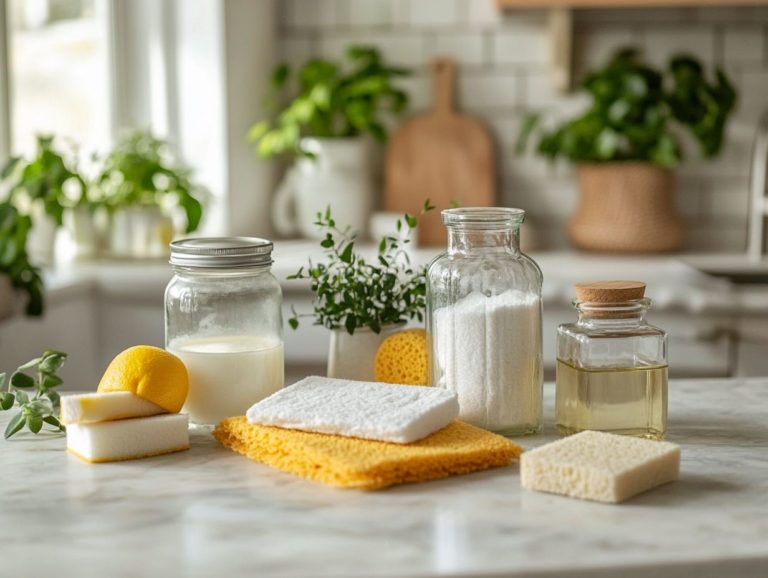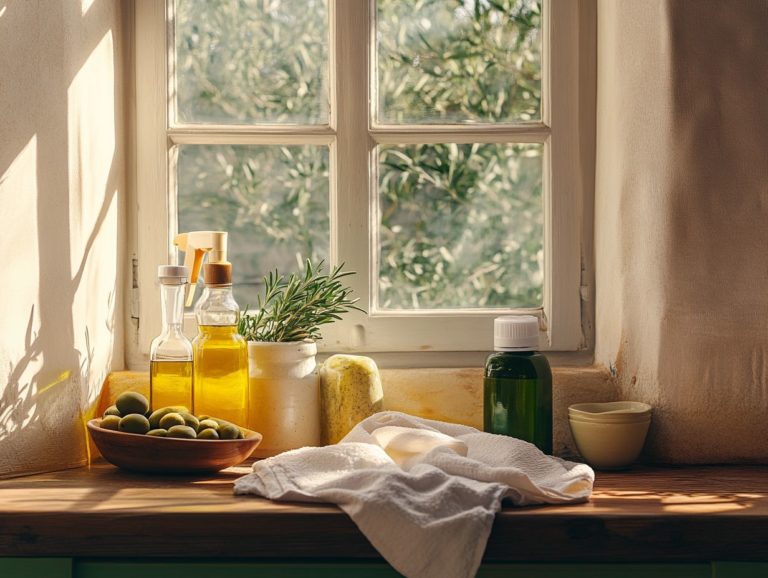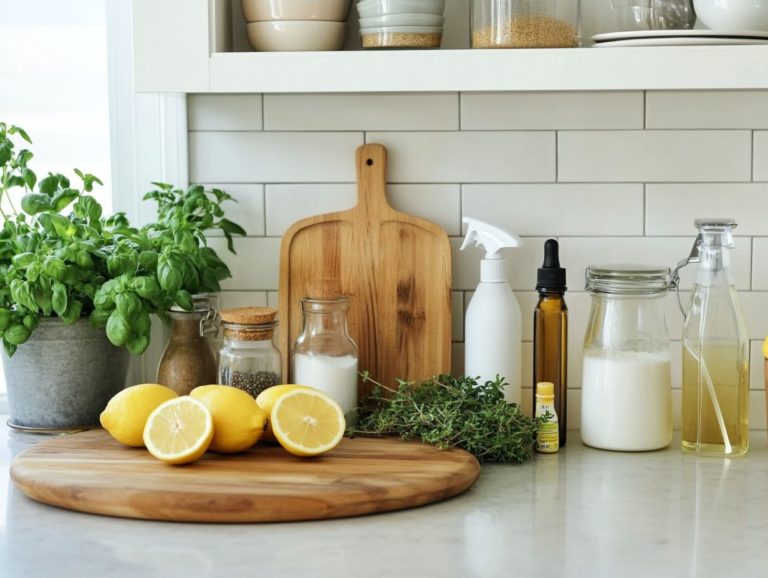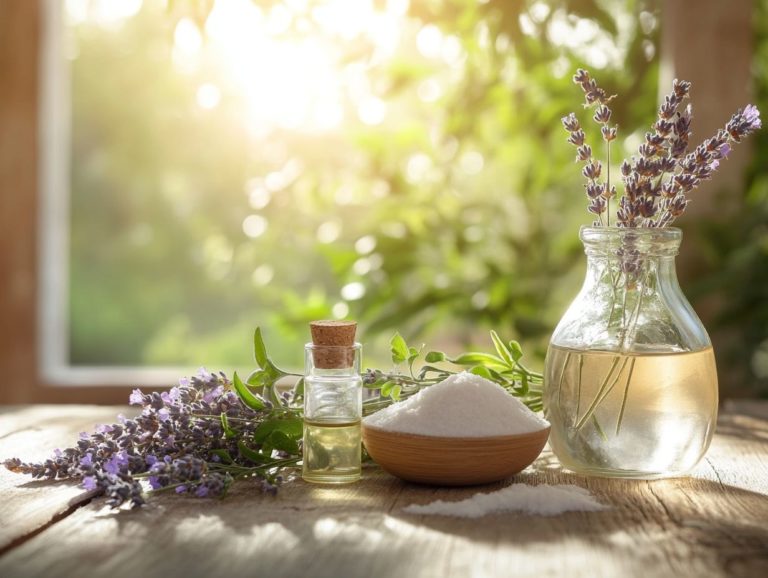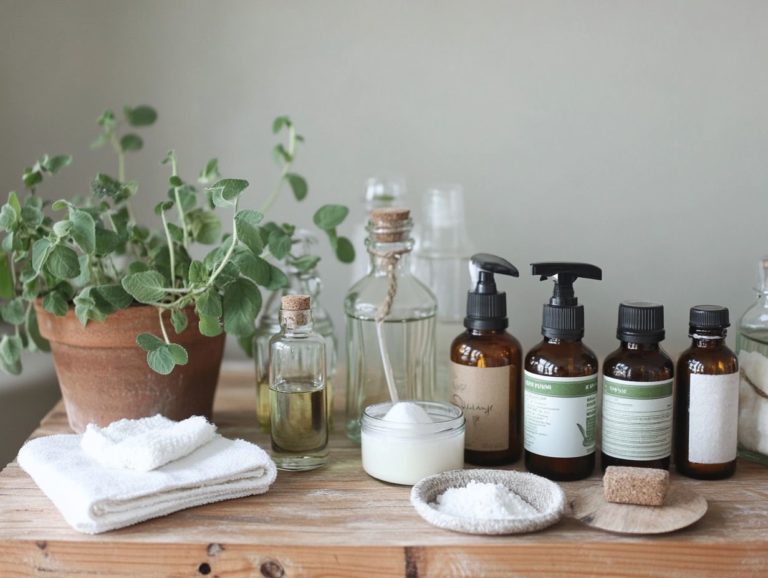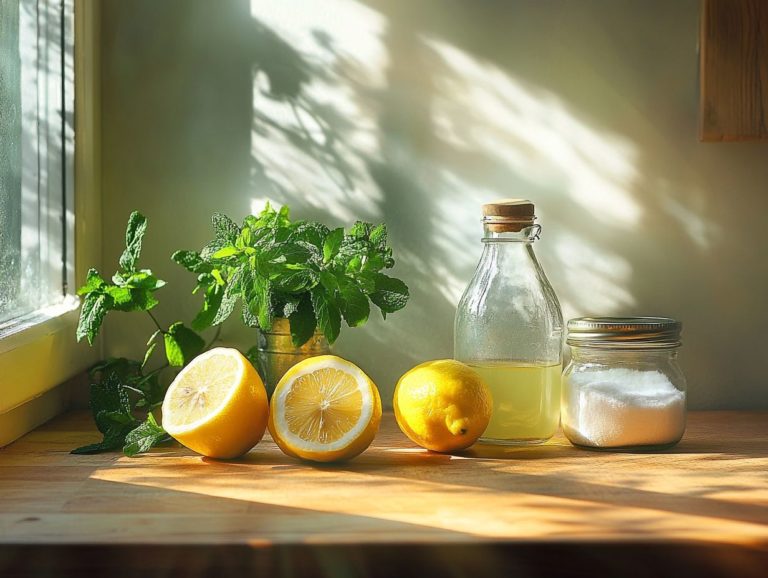How to Make Cleaning Products with Pantry Items
Creating your own cleaning products is not just a rewarding endeavor; it s a chic, eco-conscious choice that can elevate your entire cleaning routine while contributing to significant environmental benefits.
With simple pantry staples like baking soda, white vinegar, dish soap, and lemon juice at your disposal, you have the tools to concoct effective, non-toxic solutions that are kind to both your home and the planet.
This article delves into a variety of household ingredients, providing you with straightforward cleaning recipes for homemade solutions while underscoring the myriad benefits of crafting your own products.
Get ready to discover the amazing power of natural cleaning! Transform your cleaning routine today!
Contents
- Key Takeaways:
- Why Make Your Own Cleaning Products?
- What Pantry Items Can Be Used to Make Cleaning Products?
- What Are Some Recipes for Homemade Cleaning Products?
- What Are the Benefits of Using Homemade Cleaning Products?
- How to Store Homemade Cleaning Products and Ensure Their Effectiveness
- What Precautions Should Be Taken When Using Homemade Cleaning Products to Ensure Safety?
- Frequently Asked Questions About DIY Cleaning Products
- What are some common pantry items that can be used to make eco-friendly cleaning products?
- How can I make an all-purpose cleaner using pantry items?
- Can I use baking soda as a natural deodorizer?
- What is a good pantry item to use for cleaning greasy surfaces?
- How can I make a natural glass cleaner with pantry items?
- What are some pantry items that can be used to make laundry detergent?
Key Takeaways:

- Making your own cleaning products using pantry items is cost-effective, environmentally friendly, and non-toxic. It’s essential to understand the specific cleaning methods to maximize cleaning effectiveness.
- Baking soda, vinegar, lemon juice, salt, and essential oils are versatile and effective pantry items for making homemade cleaning products, such as an all-purpose cleaner or a natural stone cleaner.
- Some easy homemade cleaning product recipes include all-purpose cleaner, glass cleaner, toilet bowl cleaner, dish soap, laundry detergent, and even homemade air fresheners.
Why Make Your Own Cleaning Products?
Creating your own cleaning products has many advantages. It s kinder to the environment, saves you money, and allows you to tailor your solutions to your needs.
Plus, using reusable containers for your DIY cleaning products reduces waste significantly. Rather than depending on commercial cleaners packed with harsh chemicals and unnecessary additives, you can whip up homemade cleaning sprays and other DIY cleaners using simple ingredients you likely already have in your pantry.
This gives you control over what goes into your cleaning supplies and guarantees that they are safe for your family and pets. DIY cleaners are often surprisingly effective, often matching or even surpassing traditional cleaning products in both effectiveness and cleaning power.
What Pantry Items Can Be Used to Make Cleaning Products?
You may be surprised to learn that many common pantry items can be transformed into effective cleaning products, providing you with a budget-friendly and eco-friendly alternative to commercial options.
By using these staples, you can easily tackle various cleaning challenges. From greasy fingerprints to stubborn hard water stains, these products can do it all.
Plus, incorporating essential oils not only adds disinfectant properties but also infuses your cleaning routine with delightful scent combinations, making the task both effective and enjoyable.
1. Baking Soda
Baking soda is your secret weapon for a cleaner home! It is a remarkably effective household ingredient that can transform your cleaning routine. You can also use baking soda as a carpet stain cleaner, a deodorizer, and a gentle abrasive for scrubbing surfaces.
Its eco-friendly properties make it a top choice for those who prefer natural cleaning solutions. When mixed with water, baking soda creates a paste that effortlessly lifts stains from carpets and upholstery.
Its mild abrasiveness removes grime from various surfaces without causing scratches. As an excellent odor absorber, baking soda is invaluable for freshening up musty areas or eliminating unwanted smells.
For instance, when faced with tough carpet stains, simply sprinkle baking soda over the affected area and allow it to sit for a few hours before vacuuming it up. If you’re dealing with persistent odors, a mixture of baking soda and vinegar will work wonders; just spray it on the area, let it fizz, and wipe clean for a refreshing scent.
You can even combine baking soda with essential oils to create a pleasant fragrance, enhancing its role in your eco-friendly cleaning arsenal. This humble ingredient, often overlooked, truly excels at making your home cleaner and fresher in the most natural way possible, making it an indispensable part of your DIY cleaning products.
2. Vinegar
Discover the magic of white vinegar in your cleaning routine! White vinegar stands as a powerful natural cleaning agent, known for its ability to disinfect and remarkable versatility across various cleaning tasks. It works really well in many DIY cleaning products.
You can harness its effectiveness to create robust cleaning solutions for your kitchen countertops, windows, and bathrooms, expertly cutting through grease, grime, and mineral deposits.
When diluted with water, vinegar transforms into a spray that deodorizes and disinfects, making it an essential ingredient in countless homemade cleaning sprays and effective cleaning solutions.
Its eco-friendly nature only adds to its allure, offering you a safe alternative to harsh chemical cleaners. By combining white vinegar with water, you ll craft an exceptional window cleaner that leaves your glass streak-free and sparkling.
If you re wrestling with stubborn stains on your countertops, a simple mixture of equal parts vinegar and baking soda can work wonders, breaking down grime with a gentle scrubbing action.
This remarkable cleaning agent not only banishes odors but also collaborates beautifully with ingredients like lemon juice and dish soap to tackle a wide array of messes around your home. When used with a sponge and cloth, it enhances the cleaning power for a thorough clean.
Its bacteria-killing prowess positions it as the ideal choice for sanitizing surfaces, ensuring that your cleaning routines are both efficient and environmentally friendly. Don t wait; try these tips today!
3. Lemon Juice
Lemon juice is your go-to, all-natural ingredient that not only infuses your cleaning products with a refreshing scent but also wields impressive cleaning power against stubborn stains and hard water deposits. The citric acid in lemon juice acts as a natural disinfectant, effortlessly breaking down grime and banishing stains from surfaces. When you pair it with baking soda or vinegar, lemon juice elevates your cleaning game, making it an ideal component for your DIY cleaners. Its antimicrobial properties ensure that surfaces are not just cleaned but also sanitized, creating a healthier environment for your home.
Using lemon juice as an all-purpose cleaner is both straightforward and effective. Whether you use lemon juice directly or incorporate it with other cleaning ingredients, its versatility is unmatched. A simple mixture of lemon juice, water, and a few drops of essential oils like tea tree or lavender transforms into a powerful yet pleasantly fragrant surface cleaner.
For those pesky hard water stains, whip up a paste of lemon juice and baking soda apply it to the stains, let it sit for a while, and then scrub it away. This combination works wonderfully on various cleaning surfaces. The delightful combination of lemon’s acidity and the benefits of essential oils not only enhances your cleaning efficacy but also brings aromatherapy into the mix, leaving your spaces both immaculate and inviting.
4. Salt
Salt is one of those household heroes that often flies under the radar, yet it serves as an incredibly effective cleaning agent thanks to its abrasive qualities and spill-absorbing prowess. It also plays a crucial role in various DIY cleaners due to its natural properties.
When you combine salt with lemon juice or vinegar, you create powerful pastes or scrubs that can conquer even the toughest stains lurking in your kitchen or bathroom. Plus, its eco-friendly nature makes it a fantastic alternative to chemical cleaners, ensuring that your cleaning practices are safe for your family and the planet. Salt can deodorize spaces and refresh surfaces, showcasing its remarkable versatility in homemade cleaning solutions.
For example, you can whip up a mixture of salt and baking soda to restore tarnished silverware or jewelry to their former glory without resorting to harsh chemicals. Additionally, combining salt with other ingredients like lemon rind or rosemary can enhance cleaning efficacy.
Similarly, if you create a paste using salt, water, and vinegar, you ll find it effectively banishes grease stains from stovetops or kitchen counters. Even those stubborn carpet stains can be tackled by sprinkling salt over the affected area it absorbs the spill beautifully, and all you have to do is vacuum it up afterward.
With these clever applications, it s evident that incorporating this common condiment into your cleaning arsenal not only keeps your home sparkling but also fosters a more sustainable lifestyle.
5. Essential Oils
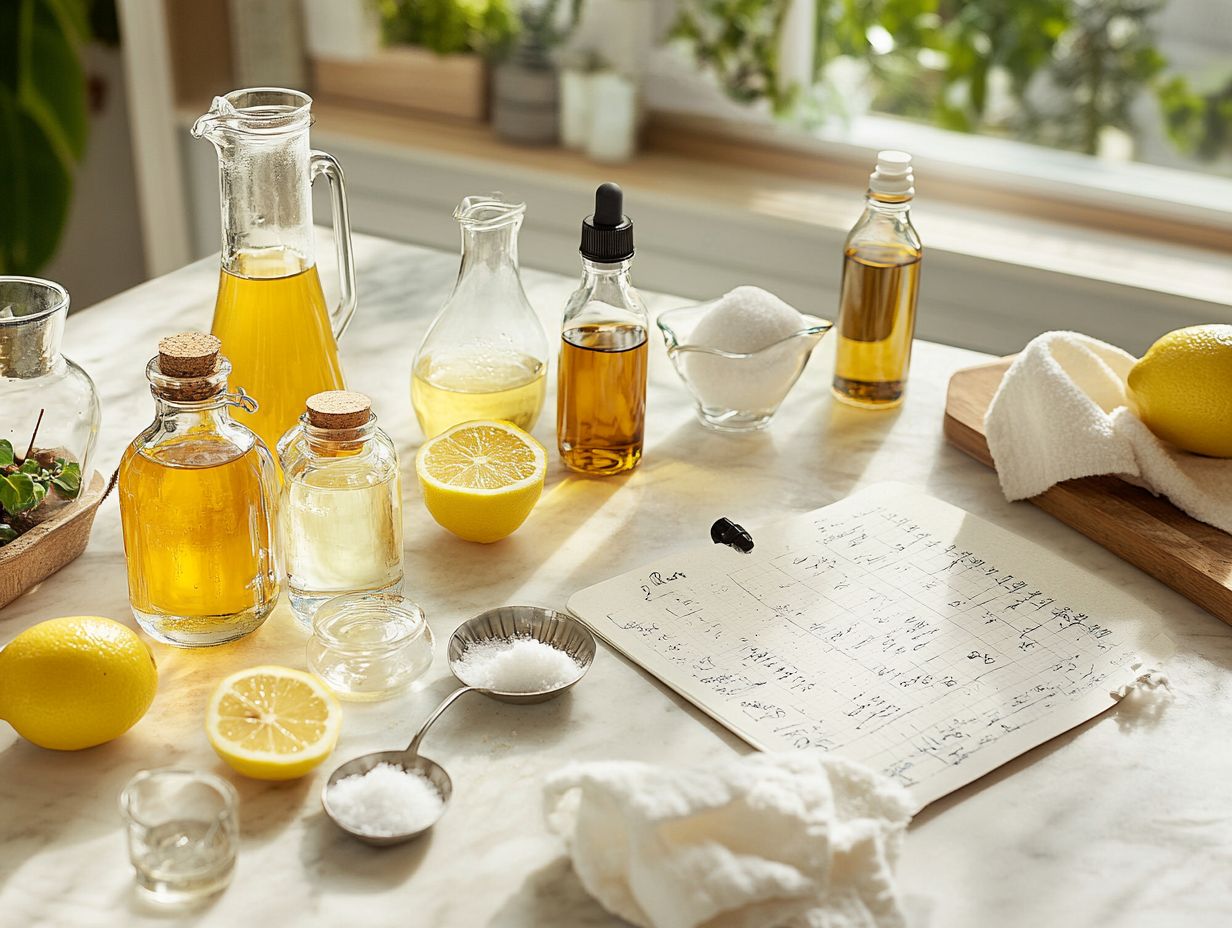
Essential oils are not just concentrated plant extracts that offer delightful scent combinations; they also have germ-fighting abilities, making them perfect for enhancing the effectiveness of your homemade cleaning products. Understanding product labels can help you choose the right essential oils for your needs.
These oils act as formidable allies in the battle against germs and bacteria, ensuring your living spaces remain both safe and hygienic. A simple DIY cleaner with essential oils can be stored in reusable containers to maintain its potency and environmental benefits.
You can whip up a simple DIY disinfectant by combining:
- one cup of water,
- one cup of white vinegar,
- and a few drops of tea tree oil, which is known for its powerful antibacterial qualities.
If you re in the mood for something refreshing, an all-purpose cleaner can be crafted with:
- water,
- baking soda,
- and lavender essential oil,
leaving behind a soothing scent while effortlessly cutting through grime. By harnessing these natural ingredients, you can create a cleaner home environment that reflects your style and values while steering clear of harsh chemicals that can irritate the senses.
What Are Some Recipes for Homemade Cleaning Products?
Creating your own homemade cleaning products is not only straightforward but also gives you the freedom to customize each recipe to fit your unique cleaning needs, using effective and natural ingredients.
Whether you re looking for an all-purpose cleaner or a specialized solution like glass cleaner or laundry detergent, many recipes exist to help you maintain a clean and fresh home without sacrificing effectiveness. These homemade solutions utilize common household ingredients like vinegar, baking soda, and essential oils, ensuring that every nook and cranny of your home is cleaned safely and efficiently.
Plus, by making your own cleaning products, you can save money while reducing your reliance on commercial alternatives.
1. All-purpose Cleaner
An all-purpose cleaner is your go-to solution, boasting versatility that allows you to tackle a variety of surfaces, making it an essential part of your cleaning arsenal.
By incorporating natural ingredients, this cleaner not only proves effective but also ensures safety for everyday use. To elevate its germ-fighting abilities, consider adding essential oils like tea tree oil, known for its antiseptic qualities, or lavender oil, which delights the senses with its soothing fragrance.
To create your own blend, combine vinegar and water in a spray bottle, then introduce about 10-15 drops of your chosen essential oil. This cleaner excels on countertops, kitchen appliances, and bathroom fixtures, effortlessly removing stains and odors without the need for harmful chemicals.
However, be cautious this solution isn’t meant for porous surfaces like marble or granite, as vinegar’s acidity could lead to damage. Always conduct a patch test on a small, inconspicuous area before applying it widely to ensure compatibility.
2. Glass Cleaner
Homemade glass cleaner is your secret weapon for achieving that coveted streak-free shine on windows and mirrors. Simply combine equal parts of white vinegar and rubbing alcohol with a cup of water in a spray bottle, then give it a good shake before use. This straightforward recipe cleans glass surfaces effectively and dries quickly, leaving no unwanted residue behind.
For an extra touch of freshness, consider adding a few drops of lemon juice, which not only enhances the scent but also boosts cleaning power. This glass cleaner is an exceptional alternative to commercial products, all while being safe for pets and children.
When it comes time to use your cleaner, selecting the right cloth is essential; microfiber cloths are your best bet, as they trap dirt and dust without leaving scratches behind. To keep those streaks at bay, apply the cleaner in a circular motion, working from top to bottom. You will love how easy it is to achieve a streak-free shine!
With these tips at your disposal, achieving a crystal-clear finish on any glass surface becomes a breeze.
3. Toilet Bowl Cleaner
A homemade toilet bowl cleaner can be your secret weapon against stains and odors while remaining gentle on both the environment and your plumbing systems.
This eco-friendly solution not only helps you save money but also reduces your exposure to harsh chemicals, making it an excellent choice for homes with children and pets. After allowing the cleaner to soak, it s vital to give the bowl a thorough scrub to eliminate any remaining residue. Once you’ve scrubbed away the grime, simply flush to wash away the cleaner.
Regular cleaning is key to maintaining not only the appearance of your toilet but also its functionality; neglecting this routine can lead to unsightly buildup, clogs, and other plumbing headaches. By weaving this cleaning ritual into your weekly maintenance schedule, you foster a healthier bathroom environment for everyone.
4. Dish Soap
Homemade dish soap can be a remarkable alternative to commercial products, offering exceptional cleaning power while remaining eco-friendly and safe for your family.
This DIY cleaner not only cuts through stubborn grease with ease but also transforms your dishwashing experience into something enjoyable. Imagine infusing your kitchen with delightful scents from your chosen essential oils whether it’s the calming aroma of lavender or the zesty freshness of lemon, these fragrances can truly uplift the atmosphere.
To create this simple yet effective soap, begin with a base of liquid castile soap, mixing it in equal parts with water. Feel free to experiment with various ratios until you discover the perfect consistency that meets your dishwashing needs.
Don t forget to personalize this recipe by incorporating natural additives like vinegar or baking soda, enhancing its grease-fighting prowess while ensuring it remains gentle on sensitive skin. This homemade solution is incredibly versatile, making it an excellent choice for any household.
5. Laundry Detergent
Creating your own laundry detergent is not only a simple endeavor but also a cost-effective way to ensure that your clothes are cleaned with safe, natural ingredients. To whip up a basic laundry detergent, combine washing soda, borax, and grated bar soap in a mixing bowl, then transfer the mixture into a labeled container for easy access.
When it s time to do laundry, simply use about 1-2 tablespoons per load, adjusting based on the size and soil level. This homemade solution not only cleans effectively but also steers clear of toxic chemicals and fragrances, making it an eco-friendly choice for your laundry routine.
By choosing to go the homemade route, you significantly reduce your exposure to harmful synthetic additives commonly found in commercial products. The process is straightforward and allows for delightful customization according to your personal preferences whether you prefer a specific fragrance or wish to keep it dye-free.
When washing your fabrics, it s crucial to consider their unique care requirements. For instance, delicate materials truly benefit from a gentle cycle with cooler water, preserving their integrity and extending their lifespan.
Adopting this do-it-yourself approach ensures that your laundry remains fresh and vibrant, showcasing your commitment to health and sustainability in your everyday life.
What Are the Benefits of Using Homemade Cleaning Products?
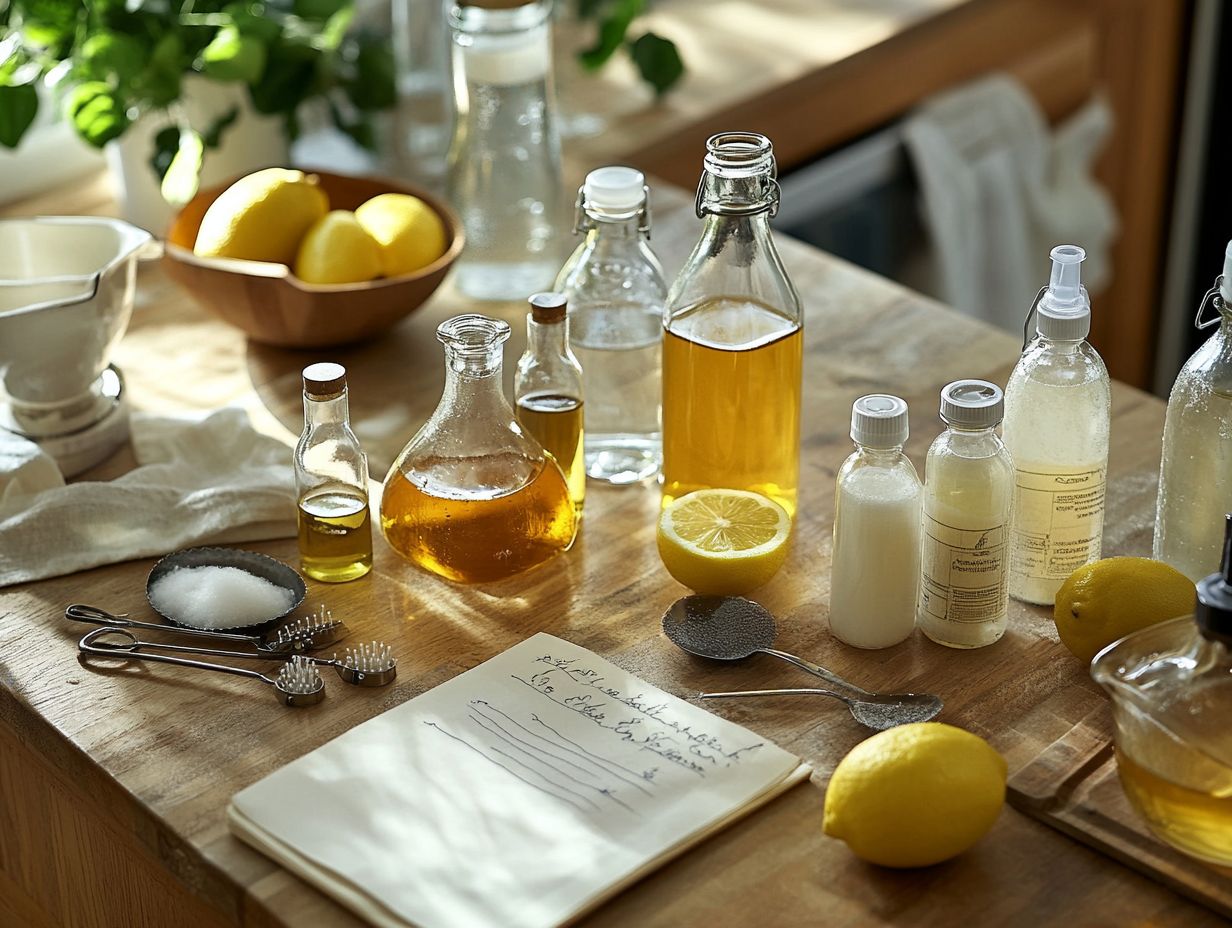
Homemade cleaning products present a wealth of benefits that elevate both cleaning efficiency and overall health within your household. One significant advantage is their cost-effectiveness; by crafting your own cleaners from everyday ingredients like vinegar, baking soda, and essential oils, you can substantially cut down on expenses compared to buying commercial cleaning supplies.
Furthermore, these DIY solutions are environmentally friendly, helping to minimize waste and lessen your reliance on harsh chemicals that can be detrimental to our planet. The flexibility to customize scents and formulations means you can tailor your cleaners to suit your specific needs, all while prioritizing the health and safety of your family and pets.
1. Cost-effective
One of the key advantages of using homemade cleaning products is their cost-effectiveness. You can save money while ensuring a pristine environment. By using common household ingredients like baking soda, vinegar, and dish soap, you can create powerful cleaning solutions at a fraction of the price of store-bought cleaners.
This financial relief adds up over time, especially in larger households where cleaning supplies are used frequently. Many DIY cleaning recipes can be made in bulk, reducing the need for ongoing purchases of commercial products.
For instance, a typical homemade all-purpose cleaner might cost only a few dollars, while a similar store-bought version can easily cost ten dollars or more. By buying ingredients like vinegar or baking soda in larger quantities, you can save even more and ensure you’re prepared for future cleaning tasks.
Buying in bulk not only lowers the price per unit but also decreases plastic waste, contributing to a more sustainable household. Since these ingredients have multiple uses beyond cleaning, the overall value becomes clear, making this approach economical and beneficial for a cleaner planet.
2. Environmentally Friendly
Homemade cleaning products are a much more environmentally friendly option than conventional cleaners, as they use natural ingredients that break down naturally and are safe for the planet. By avoiding harsh chemicals and synthetic fragrances, you can significantly reduce your carbon footprint and lessen the impact of toxic substances on waterways and ecosystems.
Making your own cleaners also reduces plastic waste generated by store-bought products. This commitment to eco-friendly practices benefits the environment and creates a healthier home for you and your family.
Take white vinegar, for example. It s an excellent cleaning agent that cuts through grease and grime while neutralizing odors all without harmful effects and safe for septic systems. Baking soda is another powerhouse; it acts as a gentle abrasive that can tackle stubborn stains and freshen carpets without the environmental downsides of chemical alternatives. Essential oils, like tea tree or lavender, provide natural antibacterial properties and pleasant scents without releasing harmful chemicals that can pollute the air. These common pantry items can be powerful cleaning ingredients in your home.
By using these simple, eco-friendly ingredients in your cleaning routine, you can significantly reduce both pollution and waste. Plus, choosing eco-friendly products can also improve indoor air quality.
3. Non-toxic Cleaning Ingredients
The non-toxic nature of homemade cleaning products is a significant advantage, especially for families with children and pets. By using safe ingredients like baking soda, vinegar, and essential oils, you can make effective cleaning solutions without exposing your loved ones to harmful chemicals found in commercial products. Focusing on safety means your family stays healthy and happy!
Some other common household ingredients, like borax and dish soap, can enhance the cleaning power of your DIY recipes.
To keep your homemade cleaners safe, implement tips like proper storage and usage. Always use labeled spray bottles for your mixtures to avoid confusion.
It s essential to keep these DIY products out of reach of young children and pets. Storing them in a secure cabinet greatly reduces the risk of accidental ingestion. Ensure proper ventilation when using these cleaners to avoid potential respiratory irritants, even from natural ingredients. A good safety tip is to test any new cleaner on a small, inconspicuous area to ensure it won t damage surfaces.
By prioritizing non-toxic ingredients and adopting smart storage practices, you can maintain a healthy home while effectively tackling everyday messes. Opting for reusable containers also benefits the environment.
Join the movement towards a safer home today! Start mixing your own cleaners with simple ingredients!
4. Customizable Scents for Your Cleaning Products
One of the delightful perks of crafting your own cleaning products is the freedom to tailor scents to your preferences. By mixing different essential oils, you can create unique fragrance combinations that enhance your cleaning experience while enjoying the benefits of aromatherapy.
For example, lemon and rosemary essential oils create a refreshing scent. A splash of peppermint oil can invigorate your senses, while lavender oil fills your space with a calming ambiance during cleaning sessions.
Customizing your scents makes cleaning feel more like a fun activity. It helps you avoid synthetic fragrances and their potential allergens, fostering healthier indoor air quality. Lemon and eucalyptus scent combinations can be very effective.
Don t hesitate to experiment with different blends; you might uncover new favorites that resonate with your mood or the season. Imagine a refreshing mix of lemon and eucalyptus energizing your space, perfect for vibrant spring months, or a warm combination of cinnamon and clove creating a cozy retreat during winter.
You can even make a homemade air freshener by mixing essential oils with water in a spray bottle. Moreover, tea tree oil adds a crisp scent and natural antibacterial properties, making it an excellent choice for disinfecting surfaces.
With a wealth of options at your fingertips, personalizing your scents can transform the mundane task of cleaning into a more enjoyable and therapeutic experience. Consider including other essential oils like rosemary or lemon for their aromatic benefits.
How to Store Homemade Cleaning Products and Ensure Their Effectiveness
Properly storing your homemade cleaning products is crucial for maintaining their effectiveness and ensuring household safety. Use clean, labeled storage containers to keep your DIY cleaners organized and identifiable, reducing confusion and potential accidents. Reusable containers also offer environmental benefits.
Glass bottles are often the preferred choice for storing cleaning solutions due to their non-reactive nature, which reduces the risk of chemical leaching. Keep any cleaners containing essential oils out of reach of children and pets, adhering to essential safety guidelines for a secure cleaning environment. For example, a vinegar solution stored in a glass bottle works well as an effective cleaner for various surfaces.
What Precautions Should Be Taken When Using Homemade Cleaning Products to Ensure Safety?
While homemade cleaning products have many advantages, it’s essential to take specific precautions for safe and effective use. Always check product labels to ensure you are using the correct ingredients.
Before applying any cleaning solution, always perform a patch test on a small, inconspicuous area especially with natural stones or delicate fabrics to prevent damage. A patch test involves trying the cleaner on a small area first.
It’s also important to consider the specific ingredients you re using, as some may interact in ways that reduce cleaning effectiveness or introduce safety risks. By implementing safety measures such as proper storage, clear labeling, and keeping cleaning products out of reach of children and pets, you can significantly enhance the safety of your homemade solutions. Using natural cleaning products can also minimize exposure to harmful chemicals.
For more cleaning tips and DIY recipes, check out resources from the Good Housekeeping Institute.
Frequently Asked Questions About DIY Cleaning Products
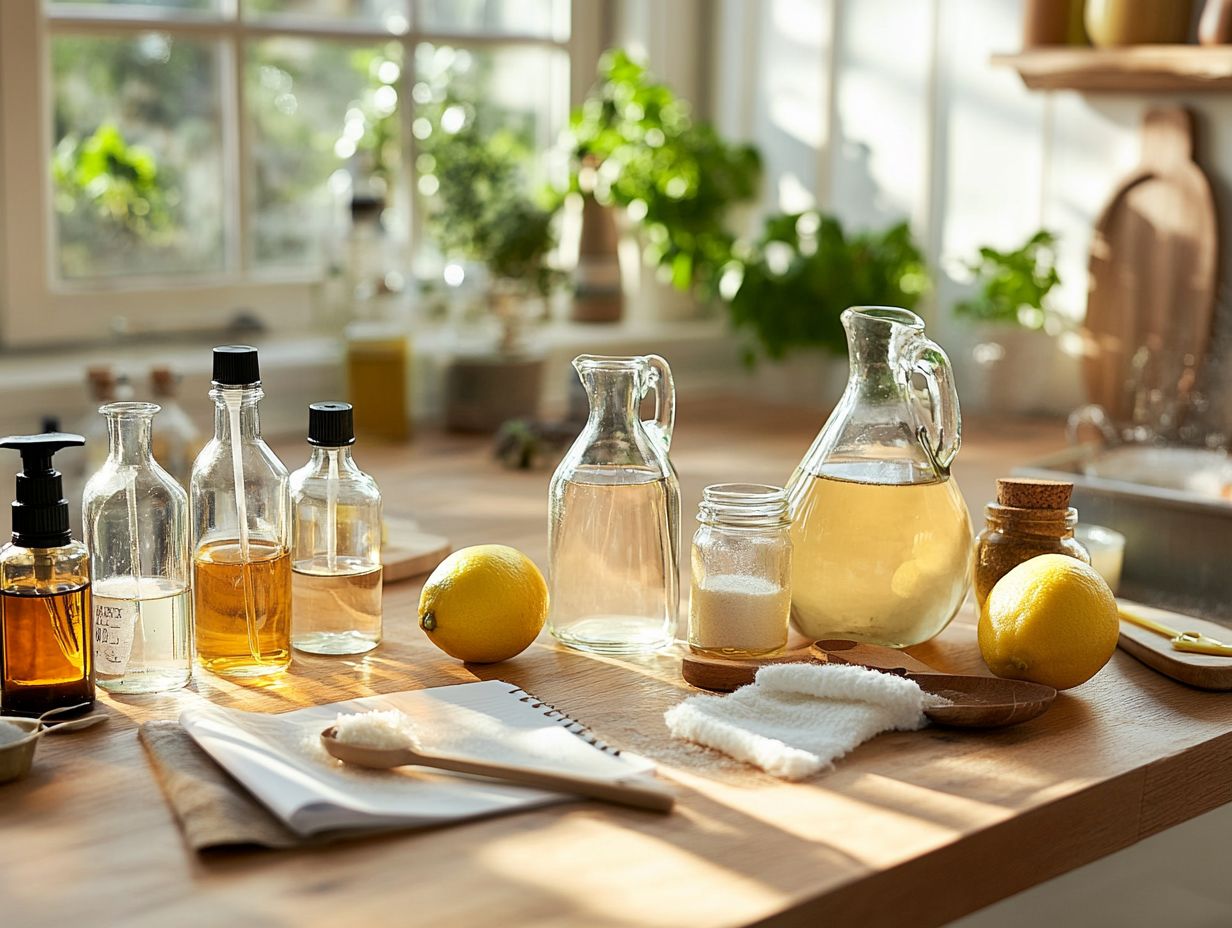
What are some common pantry items that can be used to make eco-friendly cleaning products?
Some common pantry items that can be used to make cleaning products include vinegar, baking soda, lemon juice, and essential oils. These household ingredients can be combined in various cleaning recipes.
How can I make an all-purpose cleaner using pantry items?
To make an all-purpose cleaner, mix equal parts of water and white vinegar in a spray bottle. You can also add a few drops of your favorite essential oil for a pleasant scent.
This all-purpose cleaner is effective on various surfaces.
Can I use baking soda as a natural deodorizer?
Yes, baking soda is perfect for eliminating odors. Sprinkle it on carpets, upholstery, or in the bottom of trash cans now for an instant odor-fighting boost!
It can also act as a carpet stain cleaner when mixed with water.
What is a good pantry item to use for cleaning greasy surfaces?
Lemon juice is an effective pantry item for cleaning greasy surfaces. Its tartness helps break down grease and leaves surfaces sparkling clean.
You can also use lemon rind to wipe away greasy fingerprints off kitchen appliances.
How can I make a natural glass cleaner with pantry items?
Mix equal parts water and vinegar in a spray bottle, and add a few drops of lemon juice. This invigorating blend is your secret weapon for streak-free glass!
Adding a bit of rubbing alcohol can enhance the cleaning effectiveness and make it a reliable window cleaner.
What are some pantry items that can be used to make laundry detergent?
Baking soda, borax, and washing soda are all pantry items that you can use to make homemade laundry detergent. They are gentle on clothes and eco-friendly.
Adding a few drops of essential oil can also impart a pleasant scent to your laundry.

